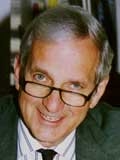Editor's Column: Managing Surgical Science

Martin McKneally
|
In this issue of the Spotlight
we report events of the past
fall, and celebrate the outstanding
Undergraduate Surgical
Education Program developed
by David Backstein, Yaron
Shargall and Carmela Calorendi.
We also welcome our new residents
to the Department and to
the dynamic and complex field
of study Surgery has become.
Its complexity is exemplified in the remarkable story of
the surgeon scientist Maria Siemionow. Her persistence
and scholarship in developing face transplantation- for
patients deformed beyond description - exemplifies the
leading edge of our specialty. Her November presentation
described on page 11 brought tears of pride to the
eyes and thunderous applause from a packed auditorium
at the Hospital for Sick Children. Her story illustrates
the commitment, courage, determination and management
skills of a great surgeon. The coordination of a
team of 30 in the operating room is only the capstone
example of the complexity of the enterprise she managed
for over a decade. Its psychological, ethical, legal, organizational
and resource issues and the ingenuity required
to resolve them could only be described by the surgeon
who accomplished this tour de force.
Similarly, the laboratory science programs led by Barry
Rubin and Subodh Verma (described on page 11) featured
collaborating scientists all over the world. As Ori
Rotstein remarked, we do not really teach this complex
management of science, except by example. Bryce
Taylor's excellent book on effective medical leadership
presents principles and techniques for managing teams
in large clinical organizations. Perhaps his advice can
be adapted to the scientific surgical enterprise by one
or more of our surgeon scientists who are privileged to
work with exemplars like these. The trial of deep brain
stimulation coordinated by Andres Lozano will involve
surgeons at 18 centres. Natalie Coburn's international
expert panel brought together
|
scholars from around the world, and will soon involve collecting data from
surgeons throughout the province of Ontario. Mohit
Bhandari's study of tibial fractures and other international
trials that he is developing further exemplify the
need for skilled management of surgical science on a
large scale.
David Latter reminds us that preparing surgeon scientists
to lead the world cannot be accomplished without
sufficient practice. As a result of the legally mandated
limit of 48 hours of duty per week, bright dynamic
surgical trainees are leaving the U.K. and Europe for
less constricted programs in North America, Australia
and the Far East where they can apply their energy and
enthusiasm to learning surgical science in its current
state of growth and development. The challenge to our
department and to surgery in general is to provide the
opportunities and role models needed to develop the
knowledge skill and judgment that defines outstanding
surgeons while maintaining life balance. A recent
survey (1) of residents in the United States clearly indicates
that renovation of the educational process is needed.
These residents believe that limitation of duty hours
won't improve their education, will lengthen their training,
but will improve the quality of their lives during
training. The initiatives underway in our department to
renovate the Halstedian training model puts us at the
leading edge of surgical education.
A spirited gathering of the families of our department
was hosted at our Holiday Party at Far Niente by David
and Sharon Latter. As we celebrate how fortunate we
are, I encourage you in the giving spirit of the holidays
to contribute to your department and your division for
the education of our new residents. We wish them well
on their entry into the world of surgery and send warm
holiday greetings to all of our readers.
(1) Drolet, Brian, M.D., Spalluto, Lucy M.D., and Fischer,
Staci, M.D. Residents' Perspectives on ACGME Regulation of
Supervision and Duty Hours - A National Survey, N Engl J
Med 2010; 363:e34
|